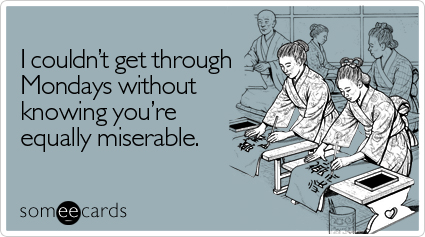In my younger days (I used to sport a shag), I knew that I was going to get married, have a couple of kids and settle down into a life that consisted of carpooling, family vacations and date nights with the hubby. Of course, this was going to happen by the ripe age of 28 because it was old enough to get married, but young enough that we could travel the world before starting our family. No, there was no white picket fence or Golden Retriever, but there was a nice Volvo parked in the garage of our 4 bedroom house with a view overlooking the city.
Ah, the delusions of being a baby child!
So now that I'm past (just barely though) the age of 28, with no hubby, no kids and most certainly no Volvo (or a garage to park it in), I have the hindsight to understand that I was not at all ready to have any of those things. But most importantly, when closely examining who I was dating or involved with in my younger days, there was no way I could have had that with them.
See, there was this prototype of the kind of man that I was going to marry. He was going to be a strong black man - tall, handsome, with a degree (preferably advanced, of course), a great career (with a sizable salary), who had great teeth and adored his mother. He would be an awesome father who knew how to cook and was both chivalrous and gregarious with a great personality. Best of all, he would be notoriously faithful and only have eyes for me.
I'd like to give a shout out to Hollywood for supporting me in my delusions.
It's not to say that this man doesn't exist; it's just that what I've described is pretty generic and sounds really good...on paper. What Hollywood often leaves out is that this great package also has some flaws. Romantic comedies have nothing to do with reality and the reality is that this man that I've described has some other not-so-great things about him. What happens when you discover your perfect person ain't so perfect after all?
Obviously, you stop dating them until you find "the one."
Just kidding! There will always be something about whomever you date that will get under your skin. Here's the real question: Is it a deal breaker? As we get older, those deal breakers often become a little more flexible. It's not because our standards are lower (at least I hope not!), but they become more realistic. More importantly, our priorities shift. A friend of mine said that they used to judge people who settled. After having more relationship and dating experience themselves, they realized that it may not have been settling; it could be that the person's priorities changed. I also believe we become more aware of what we have to offer and realize that it's unreasonable to have expectations of a mate that we don't have of ourselves.
However, there is a difference between settling and compromise. It can be difficult to decipher between the two, it's such a gray area. Here's my interpretation of the difference: settling happens when you operate and make a decision out of fear even if you know there is something significant missing in your relationship. Although everyone has their own beliefs about what is non-negotiable in their relationships, there are some common themes across the board. Attraction, similar beliefs/values/goals and common interests are most often the cornerstones of a relationship. If one of those is missing, it can be very difficult to find contentment within it. For example, you want you children but you are dating someone who doesn't. If you continue to date them because it's something fun and casual, that's one thing, but if you are dating them for fear that you won't get anyone else, regardless of the fact that you don't have the same desires, you may be settling (and headed for heartbreak). On the other hand, compromise is the acceptance of one's little idiosyncrasies and traits that may be irritating or less than ideal, but are essentially harmless. As a tall woman, I prefer a taller man. However, if I met a great guy who happened to be a little shorter than me, I'm not going to keep passing him by.
So are you settling or compromising? Only you (and probably most of your friends) know the answer. Are you choosing this person out of fear or because you genuinely enjoy who they are, quirks and idiosyncrasies included? Do you want steak, but keep accepting chicken nuggets?
And here's something else to consider - there may be things about us that the people we date may be flexible about. Shocking, yes? I am not perfect (allegedly), so as I've gotten older, I am appreciative that there are guys out there open to giving me a chance too. After all, aren't we all just a bunch of



